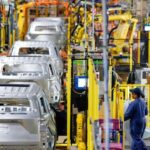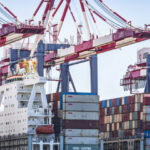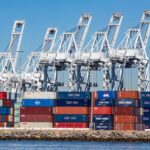By Austin Alonzo
American retailers are doing what they can to keep tariffs from affecting consumers, but they acknowledge that eventually something has got to give.
Since April, the United States has introduced a new, wide-ranging tariff schedule affecting imports from nearly every country in the world as well as certain raw materials used in manufacturing and packaging. In the following four months, publicly traded retailers in the United States have told their investors that they are taking measures to avoid raising prices in the short term.
Most often, retailers said they either frontloaded their ordering for the year to avoid raising prices or they shifted their supply chain to reduce their reliance on foreign suppliers based in China and elsewhere.
Walmart
In its latest earnings call, held on Aug. 21, Walmart CEO Doug McMillon said the Bentonville, Arkansas-based low-cost retailer hasn’t seen a significant decline in consumer confidence, nor has it raised prices notably due to tariff pressure.
However, McMillon said Walmart dodged price increases so far by front-loading its ordering schedule. As time goes on, the price it pays will continue to rise.
“As we replenish inventory at post-tariff price levels, we’ve continued to see our cost increase each week,” McMillon said.
Amazon
On July 31, Amazon CEO Andy Jassy said on the company’s quarterly earnings call that the Seattle technology giant, like Walmart, hadn’t seen prices go up or demand go down during the first half of 2025. Nevertheless, he said that it remains to be seen how the ever-evolving tariff situation will impact Amazon’s retail business.
“We just don’t know what’s going to happen moving forward,” Jassy said. “It’s hard to know where the tariffs are going to settle, particularly in China.”
Jassy said that as the Amazon ecosystem is composed of millions of individual sellers using the service, it’s hard to summarize the total impact of tariffs. Each seller, he said, has different economic factors in play.
Costco
Membership-based mixed merchandise retailer Costco decided to rework its supply chain to avoid tariff-related price increases.
In May, Costco executives said during the Issaquah, Washington-based company’s quarterly earnings call that it was re-routing goods to avoid countries with large potential tariff exposure and that it had front-loaded its ordering to minimize the impact of tariffs on consumers.
“We remain committed to providing quality items at the lowest possible prices, and raising prices is always seen as a last resort,” Costco CEO Ron Vachris said during the company’s latest earnings call.
Target
On Aug. 20, leaders of the already struggling mixed merchandise retailer told investors that tariffs are weighing heavily on the company, and they’re driving down demand for discretionary purchases.
Target CEO Brian Cornell told investors he expects that tariffs will put pressure on the Minneapolis-based company’s profitability. However, the company will avoid raising prices for as long as it can. For now, it will avoid sourcing products from China and make other logistics moves to minimize the impact of tariffs.
“We were facing some major financial and operational hurdles as we entered the year,” Cornell said. “This was further complicated by the multiple changes in tariff policy.”
Home Depot
Leadership at Home Depot forecasted modest price hikes on a number of imported goods and said it could potentially remove some items from its shelves as the tariff situation comes into focus.
“There will be modest price movement in some categories, but it won’t be broad-based,” CFO Richard McPhail said on the Aug. 19 earnings call.
The Atlanta-based chain of hardware and garden stores sources more than half of its merchandise domestically.
Lowe’s
Home Depot’s chief competitor in its sector, Lowe’s, is weighing the possibility of raising prices, too.
In an Aug. 20 conference call, CEO Marvin Ellison said the company is “not donating share to any competitor by sitting back and not being price competitive.”
Because of its practice of selling out older stock first, price hikes shouldn’t materialize until the second half of 2025, Lowe’s CFO Brandon Sink said on the same call. Like other retailers, the Mooresville, North Carolina, company is diversifying its supply chain to reduce tariff impacts.
Kroger
Bucking a trend among its peers, grocery store operator Kroger will be lowering its prices to keep consumers coming into its stores.
In June, interim CEO Ronald Sargent said tariffs would have only a small impact on its business. Raising prices at the Cincinnati-based chain, he said, will be a “last resort.”
Best Buy
Leaders of electronics retailer Best Buy predicted that Americans will halt their spending on big-ticket and discretionary purchases while tariff uncertainty hangs over the American economy.
“We believe the consumer has remained resilient while dealing with persistent inflation, making them value-focused and thoughtful about big-ticket purchases,” CEO Corie Barry said in a May earnings call.
Due to the anticipated pressure on its suite of gadgets and durable goods, the Richfield, Minnesota, company dropped its sales and earnings forecasts in May.






